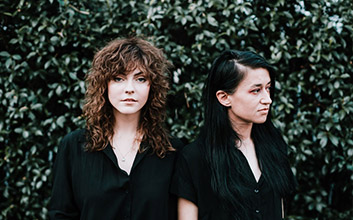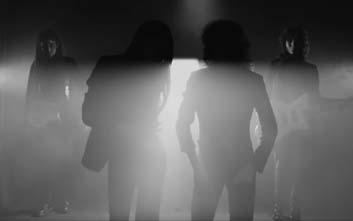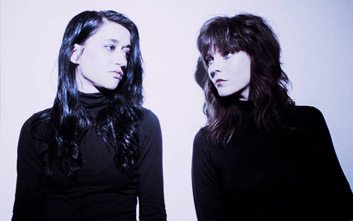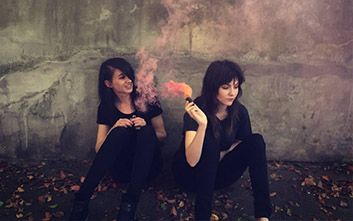We’ve been enamoured by Sydney duo Mezko ever since they put out a track called Golden back in 2015. No don’t try to look it up – they’ve deleted it. That’s because Mezko do whatever the fuck they want.
They’ve come a long way in the last three years, crafting their sound to a refined melange of industrial acid-house, punk and dream pop. Come and Go is their latest offering – a track that well and truly solidifies their creative intent. They’ve never sounded more like ‘Mezko’, more confident, or more assured of where they’re heading.
We caught up with Kat and Laura from the band to chat about the living in the new age of songwriting, why they deleted all their music and started from scratch, and the secret to their dirty, pumelling sound.
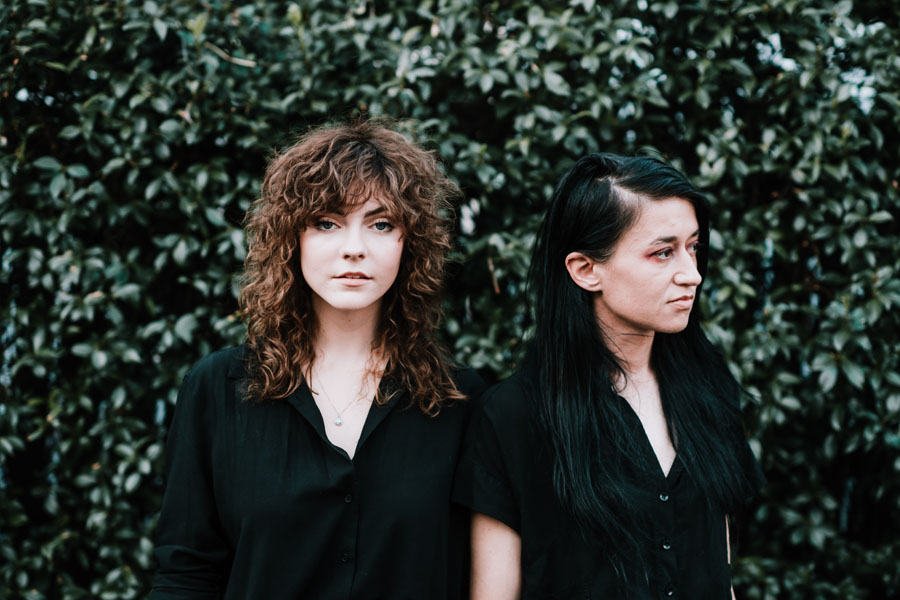
We caught up with Kat and Laura from Sydney’s favourite industrial dance-punk duo Mezko to chat about the new age of songwriting, fresh starts and the secret to their sound.
HAPPY: So I hear you’ve been in the studio today – or doing some recording at home.
LAURA: Yep! Well our studio is at home. We’ve been working on a remix.
KAT: A remix that we don’t know will come off just yet, but if it does it’ll be sick.
HAPPY: Is this just a passion project? Or something that’s going to be on a record?
LAURA: We have no idea what we’ll do with it, but it definitely won’t be on a record.
KAT: I don’t know, we haven’t done that much remixing, but every time we do it it’s been great. I love doing remixes. We’ve done a Body Type track – that song 264, which we did for Volumes last year, I guess that was our first official one. It’s a really cool creative process to do – whack your sound on someone else’s song.
HAPPY: How do you approach it? Get the stems, pull them apart, and-
KAT: And then do some Mezko tricks on it. It actually kind of makes you recognise what it is that you do that makes something ‘yours’.
HAPPY: What’s the Mezko element that you’ll chuck into it?
LAURA: [Roland SH]-101s.
KAT: The first thing is always an arpeggiator – a bass arpeggiator.
LAURA: A distorted bass arpeggiator. That’s definitely our sound.
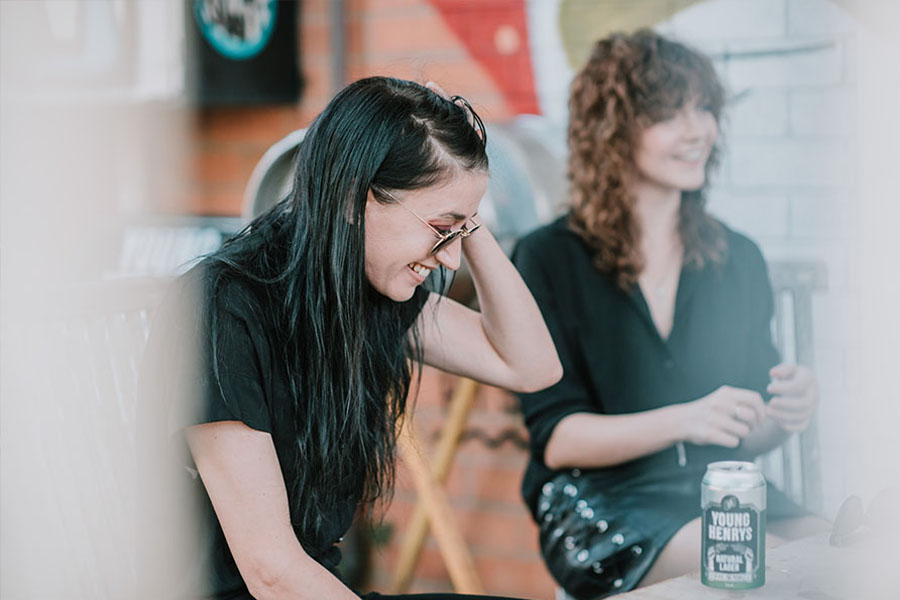
HAPPY: When I first heard Mezko, I always saw this overarching rock element to your music, even though you’re clearly not a rock band. Did you always want to make electronic music – was that the idea when you started the band?
LAURA: Um no, I mean initially – from both our contexts – we weren’t into electronic music, but when we met each other is when we really did start to get into it. So it was something that we grew into together, and that definitely has been a natural thing for the band – it was something new for us both that we developed from working together.
KAT: For us it was about exploring different kinds of tools to make music with – and the gear nerd side of us that came out. I feel like with rock music there’s this real limit to how far you can go with that, but then when you open your eyes to this whole world of electronic music and find the parts of it that you like as a fan, and the bits of gear that make those sounds. It just blew our minds when we discovered that. So Mezko is kind of us using our rock foundations and combining them with all this new exciting electronic shit – that’s what I reckon it’s all about.
HAPPY: What there a single piece of gear, something that you bought, that made you go ‘this is fucking awesome, I want to explore this’?
LAURA: I guess the [Korg] MS-20 triggered a lot of things. Ableton too, and plug-ins that we’ve just spent heaps and heaps on.
KAT: Being able to manipulate stuff in Ableton and being able to get those really hectic digital sounds was huge. And yeah the MS-20 and our [Roland TR]-606, which we have at home. Then through Anthony, our co-producer, there are lots of great vintage synths that we get to use. But combining all the really digital sounds and techniques on Ableton with that analog gear is really exciting to us.
HAPPY: I’ve read that’s very much how Kevin Parker approached recording [Tame Impala’s] Currents – pulling together all these analog rock elements and making electronic music with them. Is that kind of how you approach it?
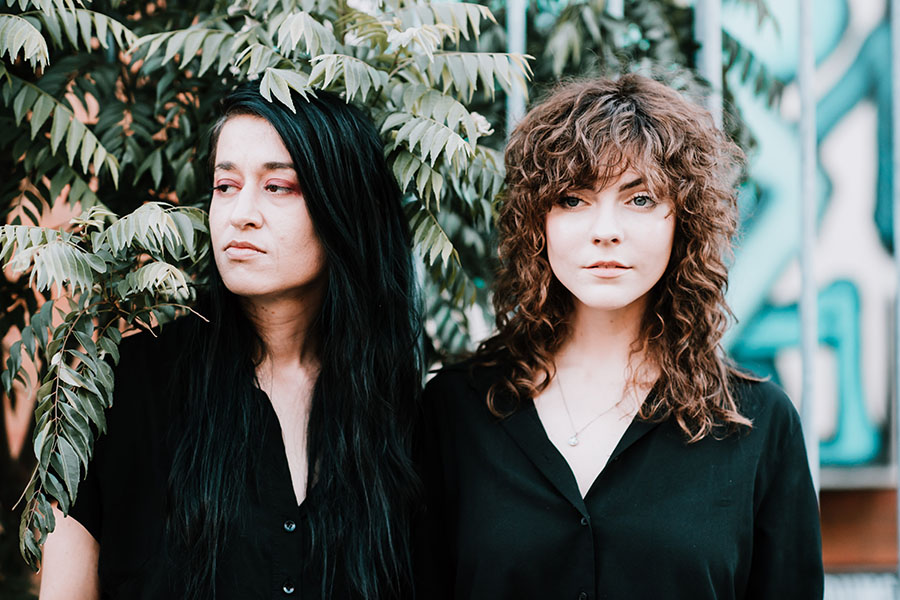
LAURA: Absolutely, yeah.
KAT: But I feel like that with this EP it’s gone full circle to the point where we’re then getting what we’ve done in Ableton on a digital plug-in and sending it back out through our ‘rock’ elements, like guitar pedals. Then it’s this whole new awesome thing.
HAPPY: How does Anthony fit into your process?
LAURA: We usually come to him after we’ve written a bunch of songs and then work with what he has available – basically it’s access to a whole bunch of awesome analog gear.
KAT: It’s also perspective from somebody who’s outside of the band on what the song is – those little things that you never notice until the end of a song, like tightening a section up or putting a drop here or there to give it more energy. He kind of comes in and tightens a few screws within the structural elements of a song and then lets us go wild on all the other gear he has – those final sprinkles.
HAPPY: Tell me about your home set-up?
KAT: It’s pretty punk. But I think that we like it that way.
LAURA: At the end of the day, because we’ve got a tool like Ableton, we can do anything. I don’t even have my MIDI keyboard in bed when I start a song. I literally am just doing everything on the laptop. And because of that you are limited, and you don’t worry so much about a sound – instead you’re worrying about writing, and enjoying the writing process more.
KAT: That’s the point where you’re sketching. Just on Ableton with headphones on in your bed. It doesn’t matter what it sounds like, you’re putting together the ‘songwriting’ element of it – chord progressions and dynamics.
HAPPY: I suppose it’s the electronic equivalent of getting a pad out and writing out chords and lyrics or whatever.
LAURA: Exactly. It’s literally the new foundation for being a songwriter – it has changed and evolved music to such an incredible point. We’re very lucky to be around at this time.
KAT: It’s kind of like, at the end of that sketching point, if it’s a huge mess, then that’s great. It’s more about gathering ideas. It’s just one big fucking playground of ideas. The next stage after that is when we start refining it. It’s the bit where we’ll start thinking about what kind of sounds we can make with the tools we’ve got, and then what new things we can add along the way.
HAPPY: So does that mean you are both always writing alone?
LAURA: It’s a combination, I guess it depends. Sometimes we like jamming and being little nerdy…rock lords. And sometimes we enjoy our solo time. You can almost kind of recognise which songs were recorded that way. Also sometimes we’ll start songs together then be like ‘I want that one, or I want that one’ and then go off on our separate ways, then bring them back together.
KAT: It’s kind of like ‘pass the parcel’, but we always let whoever’s vibing on a particular idea on a song get their time to do their thing with it.
HAPPY: That’s interesting because when you first started playing you would face each other and there was obviously this very close dynamic…
KAT: That’s funny because at the start, when we first started playing live just the two of us, we’d always face each other because we really needed that connection with each other. And it’s like we’ve gradually got the point where we’ve gotten over that co-dependence.
LAURA: Yeah, I also just think it was because we thought it looked cool… [laughs] And then we realised that we can feel the music in our own ways. I am a bass player and Kat is a guitarist at the end of the day. And sometimes if you’re following a guitarist when you’re a bass player and vice versa… it’s not really the way a band works. So the way we’ve got it set up now is that we’ve got our own space to be in our own element.
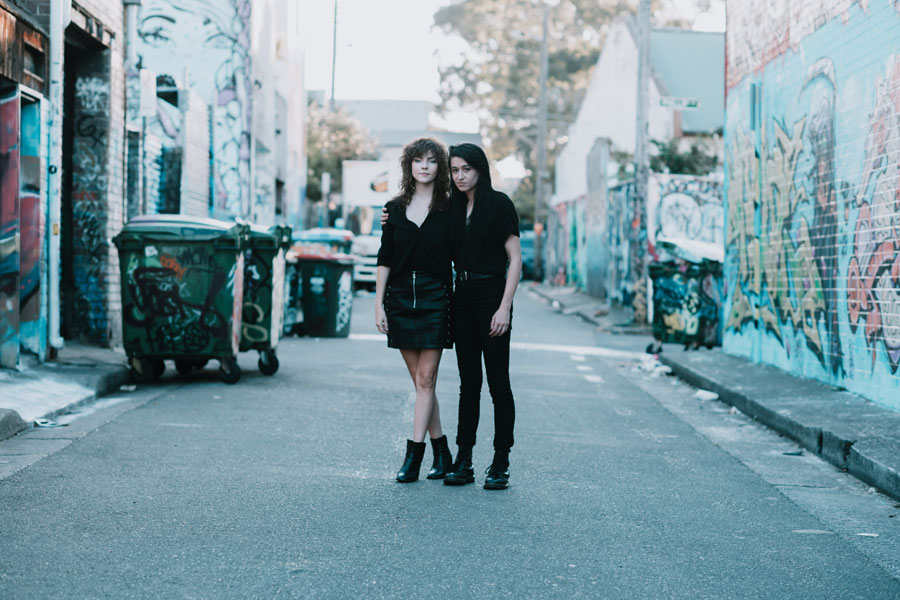
HAPPY: I also noticed that you took down everything you had released prior to Trust. Why was that?
KAT: I think that a couple of our early tracks were just us trying to figure out our sound. There’s certain edges or corners that we pushed it to, and we realised it wasn’t quite right – that’s not actually what we meant by that when we were making it.
LAURA: At that time we were learning about production so much. We won that amazing competition for Studios 301 and we were learning so many new things about sounds and were so excited about these new sounds that we kind of forgot what we really love. And so a song that was meant to sound like a Horrors’y, kraut, punk song – which was Journey’s End – ended up sounding like Donna Summer remixed by fucking Diplo. And we weren’t really that stoked on it in the end.
KAT: It guess we learned a lot about when things get too slick. For us, recognising where the sweet spot is – to be a bit broken and fucked up. That’s a hard thing as an artist, to recognise where the unpolished side of music works better.
LAURA: That is honestly the challenge for any artist – and lots of the artists I love – more often than not they end up hating what they create within a week of it. Like Gesaffelstein – he can’t anything because he hates it so much afterwards, but everything he makes – to me – is perfection. And I think that’s a good way to be. It’s a hard way to be, but at the same… [deleting the tracks] was a decision that we made full based on realising that that wasn’t really us, and that it was a moment in time that we were just really excited about.
HAPPY: I think that’s really important, to be real enough and serious enough about your craft to be able to make a decision like that.
LAURA: And who knows, maybe we’ll end up reworking them the way we wanted them to sounds. I feel like Journey’s End and Golden needed to be heaps more driven, more punk. All the riffs and stuff are there, but we just made it too pop.
HAPPY: Why do you think they were too slick?
KAT: It was us trying too hard. Seriously it was.
LAURA: Yeah. It’s funny, now we don’t really fit in anywhere. We’re not electronic enough to be electronic, not band enough to be in with all the band kids, and I think Sydney is really segregated in that way. We love what we do, and we’re very passionate about it, but it is an interesting situation to be in.
HAPPY: So then where do you see yourselves fitting in moving forward – is that even something you care about?
LAURA: Moving forward, all we can do is be ourselves. Perhaps we will find a collective, perhaps not, it’s nothing we care too much about, although it would be nice we will just keep doing us and enjoy the freedom of being genreless.
Mezko’s new track Come & Go is out now via Inertia, check it out on Spotify. And check out their June tour dates here.
